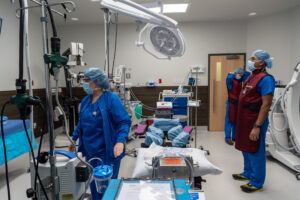
USA, December 19 2024- Back and neck pain can take many forms, but two common culprits—pinched nerves and degenerative disc disease—share the stage as significant sources of discomfort. These conditions can affect people at various life stages, presenting challenges ranging from mild inconvenience to chronic pain. This article explores the causes, symptoms, and treatment options for pinched nerves and degenerative disc disease, providing insights to help you understand and manage these conditions effectively.
What Are Pinched Nerves and Degenerative Disc Disease?
A pinched nerve happens when nearby tissues exert too much pressure on a nerve, interfering with its function. This can occur anywhere in the body but is most common in areas where nerves exit the spine, such as the neck and lower back.
Conversely, degenerative disc disease refers to the gradual breakdown of spinal discs, which act as shock absorbers between the vertebrae. This condition is particularly prevalent in the lower lumbar spine, often referred to as lower lumbar spine degenerative disc disease, leading to pain, stiffness, and reduced mobility over time.
Common Symptoms of Pinched Nerves and Degenerative Disc Disease
While these conditions are distinct, they share some overlapping symptoms. Understanding these signs can help guide you toward the appropriate diagnosis and treatment.
Pinched Nerve Symptoms
- Localized Pain: Pain near the compressed nerve, which can radiate to other areas.
- Tingling or Numbness: Often felt in the arms or legs due to nerve irritation.
- Muscle Weakness: Affected muscles may feel weaker or fatigued.
- Reduced Range of Motion: Discomfort that limits movement in the affected area.
Degenerative Disc Disease Symptoms
- Persistent Back Pain: Pain levels may fluctuate with activity or prolonged sitting.
- Stiffness: Reduced flexibility in the spine, especially in the lumbar region.
- Radiating Pain includes areas like the hips, thighs, or buttocks due to irritated spinal nerves.
- Increased Pain When Moving: Activities like bending or twisting can exacerbate symptoms.
Causes of Pinched Nerves and Degenerative Disc Disease
Causes of a Pinched Nerve
A pinched nerve occurs when surrounding tissues compress peripheral nerves. Some typical causes are:
- Herniated Disc: A bulging or ruptured disc pressing on a nerve.
- Bone Spurs: Bony growths, narrowing the spaces where nerves exit the spine.
- Inflammation: Swelling from injury or overuse can compress a nerve root.
Causes of Degenerative Disc Disease
Disc degeneration is often the result of aging but can be accelerated by certain factors:
- Wear and Tear: Spinal discs naturally lose hydration and elasticity over time.
- Injury: Sudden trauma can damage spinal discs, leading to premature degeneration.
- Genetics: A family history of spinal conditions may increase the risk.
Can a Pinched Nerve Heal on Its Own?
The good news is that many pinched nerves can heal without medical intervention, provided the compression is mild. Recovery may take a few days to several weeks, depending on the severity of the condition and the treatment approach.
When Self-Healing Is Possible
- Rest: Avoiding activities that worsen symptoms can help the nerve recover.
- Anti-Inflammatories: Over-the-counter medications like ibuprofen can reduce swelling and relieve pain.
- Gentle Stretching: Exercises designed to relieve pressure on the nerve may accelerate healing.
When Professional Treatment Is Needed
If symptoms continue or become more severe, consulting a healthcare provider is crucial. Chronic compression can lead to long-term damage to the nerve root.
Treatment Options for Pinched Nerves and Degenerative Disc Disease
At Vetrae, we believe in a comprehensive approach to treatment, combining conservative methods with advanced therapies tailored to the patient’s needs.

Treatment for a Pinched Nerve
- Physical Therapy: Targeted exercises can reduce pressure on the nerve, improve mobility, and prevent recurrence.
- Muscle Relaxants: These medications help ease muscle spasms that may exacerbate nerve compression.
- Steroid Injections: Corticosteroids can reduce inflammation and provide temporary relief.
- Surgical Intervention: In severe cases, surgery may be required to remove the source of compression, such as a herniated disc.
Treatment for Degenerative Disc Disease
- Physical Therapy: Strengthening the muscles supporting the spine can improve posture and alleviate pain.
- Inflammatories: Medications like NSAIDs help manage pain levels and reduce inflammation in the affected area.
- Lifestyle Adjustments
- Keeping a healthy weight can help minimize stress on the lumbar spine.
- Practice good posture to minimize strain on the spinal cord.
- Avoid activities that worsen symptoms, such as heavy lifting or prolonged sitting.
- Surgical Options: In advanced cases, procedures like spinal fusion may be necessary to stabilize the spine.
Preventing Back and Neck Pain
Prevention is always better than cure, especially regarding spinal health. Here are some tips to reduce your risk of developing pinched nerves or degenerative disc disease:
- Stay Active: Regular exercise strengthens the muscles supporting the spine and improves flexibility.
- Practice Good Ergonomics: Ensure your workstation promotes proper posture and alignment.
- Lift Safely: Use your legs, not your back, when lifting heavy objects to avoid strain.
- Maintain a Healthy Weight: Excess weight can increase the load on your lumbar spine, accelerating disc degeneration.
Final Thoughts
From pinched nerves to degenerative disc disease, understanding the root cause of your discomfort is essential to finding the right path to recovery. If you’ve ever wondered, “Can a pinched nerve heal on its own?” the answer often depends on the severity of the condition and the care you provide for it. By recognizing common symptoms, exploring treatment options, and taking preventive measures, you can manage or even avoid these conditions.
At Vetrae, we’re committed to helping you achieve lasting relief through personalized care. Whether you’re dealing with mild discomfort or chronic pain, our team will guide you every step of the way. Take control of your spinal health today—your future self will thank you.
Media info:
Website: https://vertrae.com/
Contact: 844-255-2225
Address: 4501 Lyons Road, Miamisburg, OH 4534

